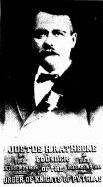|
Pythian knighthood had its conception
in the exempli- fication of the life test of true friendship existing between Damon and Pythias.
Friendship, or mutual confidence,
being the strongest bond of union between man and man, and only existing where honor has an abiding place, is adopted as a
foundation principle.
As the ideal knight of olden time was the personification of all the higher and nobler
attributes of man's nature, the candidate for knighthood had to prove himself worthy of acceptance by those who valued friendship,
bravery, honor, justice and loyalty.
The Knights of Pythias is dedicated to the cause of universal peace and is pledged to
the promotion of under- standing among men of good will as the surest means of attaining it.
The order Knights of Pythias - founded in Friendship, Charity and Benevolence, which
it proclaims as its cardinal principles - strives to gather into one mighty fraternaity worthy men who appreciate the true
meaning of friendship; who are cautious in word and act; who love truth; who are brave in defending right; whose honor is
untarnished; whos sense of justice will prevent, to the best of their ability, a personal act or word injurious to the worthy;
whose loyalty to principle, to family, to friends, to their country and to the constituted authority under which they enjoy
citizenship is undoubted; and who, at all times, are prepared to do unto others as they would that others should do unto them.
|
|

JUSTUS H. RATHBONE
Founder Knights of Pythias
In response to the anger, hatred, and revenge that was rampant during the Civil
War years, Justus Henry Rathbone felt an urgent need to rekindle brotherly sentiment throughout the land. He believed that
the spark of brotherly love kindled by the old Pythagorean Brotherhood still burned deep in the hearts of men. He decided
that this old spirit could be revived and a new fraternity could be established under which men would gather under one common
banner. Based upon the power of the comradeship of Damon and Pythias, and that men who appreciated the true meaning of human
friendship could unite, Rathbone proposed a new organization. This mighty fraternity was to be based upon the glorious trinity
of Friendship, Charity, and Benevolence, and would proclaim "Peace on Earth, Good will toward men".
Brother
Rathbone was so impressed with the story of Damon and Pythias that he was determined to do all in his power to induce men
to follow their example. He stated that the high type of friendship therein portrayed seemed to him to be the basis upon which
a fraternal society could and should be established.
Early in 1864, Brother Rathbone called four of his friends
together, took a Bible given to him by his mother, administered the obligation and read to them the ritual that he had prepared
in manuscript form. Four days late, in Washington, DC, Brother Rathbone, assisted by the four friends whom he had previously
obligated, instituted Washington Lodge No. 1, the first lodge of the Order. The thirteen charter members adopted his ritual
with scarcely any change in context.
Our founder was reared amid excellent home surroundings. His father, Justus
Hull Rathbone, was a Utica lawyer, and his mother, Sarah Elizabeth Dwight, was from a prestigious Presbyterian family. Educated
in local schools, he graduated from Madison University (now Colgate) and was a talented musician. One of his musical compositions
was played at President Garfield's inaugural ball. In addition, he was a versatile writer, a great Shakespearean scholar and
possessed a great deal of dramatic ability.
His career spanned several disciplines, including teaching school
at Eagle Harbor, Michigan; citizen nurse in the U.S. Hospital at Germantown, Pennsylvania; and various government positions
in Washington, DC.
Brother Rathbone, who had long been suffering from ill health, passed away on December 9,
1889, at the age of fifty-one, while on a lecture tour for the order. He was buried with full Pythian honors in New Forest
Cemetery, Utica, New York, and soon thereafter was officially designated as the Founder of the Order.
|

